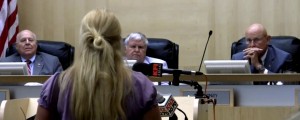
Last December The Fullerton Redevelopment Agency approved yet another extension to Pelican, the hapless developer of the gigantic Amerige Court project downtown. Readers will recall that this project was approved in 2008 over the objections of hundreds of people who saw it for what it was, yet another cheap looking, insipid copy of the retail/loft model that is supposed to revive downtowns.
This time the now unemployed redevelopment staff allowed the developer to plan to rent the housing units at first, even though when it was first approved years ago it was supposed to be all about classing up the area by inviting the landowning gentry to move in and stare down the lawless drunks of Fullerton’s bar culture.
So two months ago, despite several people speaking out against the fourth (!) amendment to the original agreement, and no one speaking in favor of it, the extension was granted. Bruce Whitaker and Sharon Quirk-Silva dissented, having had enough of developer excuses for why they haven’t been able to build anything, but Bankhead, McKinley, and Jones predictably went along with this giveaway of taxpayer owned land in the heart of the city.
Well, that was back before Redevelopment disappeared last week, so now they have to do it all over as the City Council tonight.
Show up to watch developer owned politicians try to give away your land once again, if you let them.
Last week we showed you why the Three Dinosaurs were so willing to perpetuate this disaster of a project.
When you take their money, you have to do their bidding. Besides, if you can give away public land to build a monstrous and unneeded architecturally appalling project that will add more traffic to the area and tear down some really old buildings to do it, why wouldn’t you? Especially when the half of the development partnership that’s still in business gives you $500 to keep you from being recalled?



